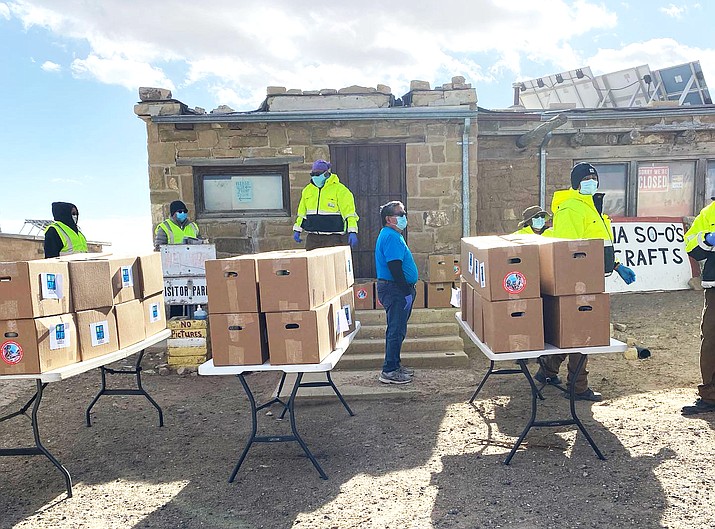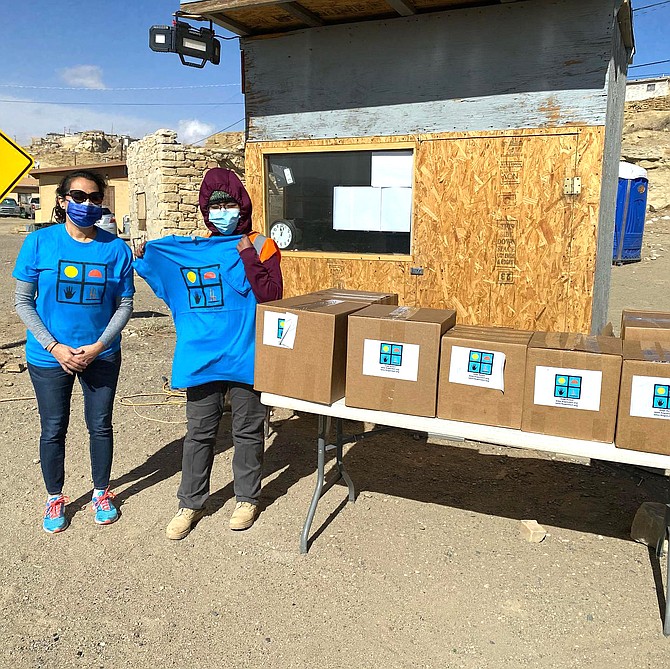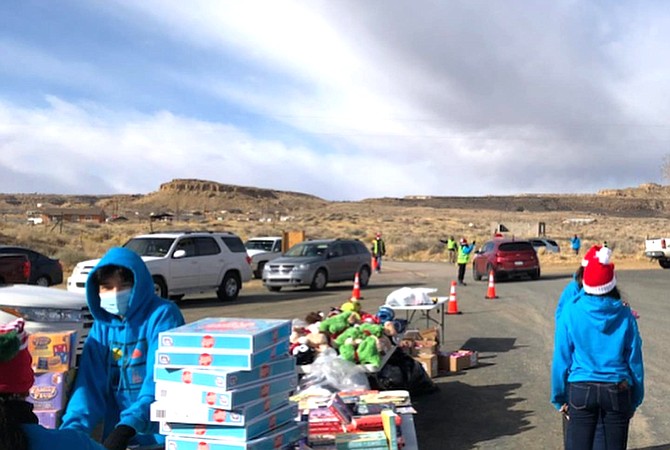Hopi Relief delivers aid to villages; plans for virtual 10K
Grassroots organization has delivered 13,000 boxes of food, hygiene supplies to the Hopi
FLAGSTAFF, Ariz. — With a new executive director, the only employee in its organization, Hopi Relief is still going strong and delivering help to the Hopi villages as the COVID-19 pandemic wears on.
Hopi Relief, a 501c3 nonprofit, was founded by members of the Hopi Tribe and is a grassroots effort to provide assistance on Hopi during the coronavirus. It has delivered about 13,000 boxes of food, hygiene supplies and essential items to the Hopi people since May 2020.
While much of the operation is based out of Phoenix, Wendi Lewis, executive director for Hopi Relief, is on Hopi, which makes coordination and figuring out what needs each village has easier.
Lewis started volunteering with Hopi Relief in May of 2020.
“I was essentially doing what I am doing now,” Lewis said. “Connecting them with people. I was born and raised on Hopi, so I have a fairly strong connection with the people on Hopi.”
Lewis would help set up distribution places, make connections for the organization to use specific site location, helping to set up drive-through processes and communicating with the village leaders to find out what items they wanted and needed.
“We don’t like things to go to waste,” Lewis said.
Lewis also fundraises for the organization, including grants.
“Just funding for the operation itself,” she said.
Hopi Relief checks in with Community Service Administrators for each village to see what the needs are, whether it’s food or other items.
Water is always a need, Lewis said, especially for those without running water. Hopi Relief also supplies food boxes and paper supplies, including napkins, toilet paper, tissue and feminine products. They hygiene boxes are always a hit.
“They really liked their hygiene boxes last year,” Lewis said.
With a generous donation from Dr. Michelle Tom, Hopi Relief received a generous supply of Lysol wipes and spray. There was also a donation from Loreal and Lush of supplies..
“We’re trying to build more relationships like that, so we can give [the Hopi people] quality products in their boxes and items they really like,” Lewis said.
Lewis said Hopi Relief coordinates with all the villages on Hopi, but not only are they trying to coordinate with each village, but also with other grassroots organizations too — like the Hopi Foundation emergency relief or the Navajo and Hopi Families COVID-19 Relief — to make sure that the relief is spread out and not duplicating service with the villages.
“Once we go through all 12, we turn back around and say, ‘Ok, we can go back and start serving the beginning again,’” Lewis said.
Running for relief
The Hopi Relief 10K is a virtual running event which will take place April 30-May 2 to raise money for the organization.
Participants are asked to complete their 10K run on any day from April 30 to May 2 and each participant will get a ‘Footprints for Hopi t-shirt’, a 10K medal, a Hopi Relief runner’s racing bib, entry into the runner’s raffle featuring Hopi art and other prizes and an info card with a QR code that will have all race event submission information.
All the proceeds from the event will fund future and other supply distribution events for the Hopi people. Registration is available at https://hohongvit.com/products/hopi-relief-10k-race-kit. Questions can go to Wendi Lewis at wendi@hopirelief.org.
“We are seeking sponsorships from companies,” Lewis said.
Lewis also said that for fundraising in general, monetary donations work better than anything else because, aside from purchasing exactly what each village wants, the money also goes toward the U-Haul rentals to transport the goods up to Hopi.
“The monetary donations work the best for us,” Lewis said. “But we love these donations by items, too.”
April donation campaign
Hopi Relief is kicking off a campaign in April where people can donate specific items, one week will be toothpaste, another week would be feminine products, where people can drop them off at specific locations and Hopi Relief volunteers would come pick them up.
“We’re going to try that out and see how it works,” Lewis said. “And it will be based on some of the items that the villages are requesting. But generally, monetary donations works the best for us.”
Lewis said, the personal connection with people in the villages, is important because people on Hopi know her and they feel comfortable talking to her and telling her what they would like in the boxes Hopi Relief delivers.
“They know we’re not going to take offense,” she said. “We genuinely want to know what needs to go in each of the boxes so we’re not spending money on items that the people aren’t using or needing.”
The reception on Hopi to their work has been positive.
“We encourage all our volunteers to always be friendly,” Lewis said, adding the members of the villages know them by now by the U-Haul’s they bring up. If people miss out on deliveries, Lewis said they feel comfortable approaching the volunteers and inquiring if they have any more boxes.
“We try really hard to remember those people, too, and make sure that we inform them and follow up with them, [when we will be coming back],” Lewis said. “They know we are listening to them. We receive compliments from the various people on our boxes and I like to think that we’re accepted and well-received.”
Lewis said whatever initial suspicion that was directed toward the group has disappeared. She said she initially had some, too.
“[I initially asked, ‘What is Hopi Relief? Who is this person trying to come in?’” Lewis said. “Everyone has full-time jobs. They’re doing this while they’re working… a lot of the time they’re loading things up at midnight or at 5 in the morning. It’s just amazing. As someone inside of Hopi looking out, you see their genuine desire to just help. They’re not being compensated for it and that’s amazing to me.”
Hopi Relief always needs volunteers, both in the Valley and on the Hopi reservation. More information about Hopi Relief or to volunteer or donate is available at hopirelief.org.
SUBMIT FEEDBACK
Click Below to:






